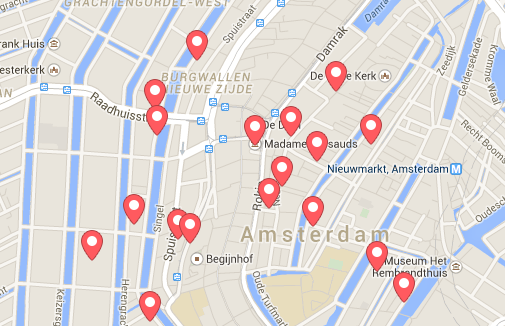Airbnb report reveals Amsterdam rental levels and effects of new crackdown

Map showing Airbnb locations in central Amsterdam
Airbnb has for the first time revealed that its owners hosted 2.5 million overnight stays in Amsterdam in 2017.
The owners welcomed 800,000 visitors, who stayed for an average of 3.4 days, almost twice as long as the typical stay in a hotel or guesthouse that year, according to the company.
The figures are revealed in a report written by consultancy Ecorys and commissioned by Airbnb, which examines the impact of three Amsterdam city government proposals to control soaring tourism.
To forbid
Yesterday the city government announced its intention to completely ban Airbnb rentals in three parts of the city, including the red light district, due to perceived negative impacts on social cohesion, rising property prices and inequality.
Next year, the maximum number of days private house owners can rent to tourists will be limited to 30 days, up from 60 currently.
Meanwhile, Dutch MPs have offers treat counterfeit housing rental as a tax crime and crack down on tax evasion. The government aims to create a national private rental registration system within one year, after concerns on illegal rental and “overtourism”.
The new Ecorys report, however, points out that Airbnb accommodation – not counting other short-term rental brokers such as Booking.com – accounts for a modest 11.9% of all overnight stays in the Dutch capital. He also claims that his hosts are responsible for more than a fifth of the 2.3 billion euros spent in Amsterdam.
New rules limiting private rentals to 30 nights a year will result in 310,000 fewer room nights, the report says, while new hotels in the pipeline will add 3.7 million annual room nights by 2022.
“Despite these rules [to control tourism] in the coming years, many more tourists will come to Amsterdam… The number of visitors is expected to increase by around 2.1 million,” the report states.
He also argues that Airbnb apartments are more spread out across the city than hotels, which are concentrated in central areas.
“Measures to curb Airbnb-related tourism… will have a limited effect on the total number of Amsterdam,” he adds in his findings. “But because Airbnb customers spend more on average, the effect on spending will be relatively larger.”
Round table
Bernard D’heygere, spokesman for Airbnb, told DutchNews.nl that the company had written to the Amsterdam council to organize a “round table” with other tourism-related organisations, and the company said. welcome a registration regime.
A spokesperson for Amsterdam City Council said the figures in the Ecorys report correspond to the amounts transferred by Airbnb in tourist tax.
“We are aware of Airbnb’s invitation for the roundtable,” she added. “However, I would like to point out that the City of Amsterdam is already in contact with all kinds of players in the tourism sector and that this subject is a high priority for the City Council, the Mayor and the Deputy Mayors.”
DutchNews.nl asked Airbnb for the full dataset behind the new report, along with a commentary.
This article was updated on October 12 to reflect Airbnb’s responses to questions.
Thank you for your donation to DutchNews.nl
The DutchNews.nl team would like to thank all the generous readers who have donated over the past few weeks. Your financial support has helped us extend our coverage of the coronavirus crisis into evenings and weekends and ensure you are kept up to date with the latest developments.
DutchNews.nl has been free for 14 years, but without the financial support of our readers, we would not be able to provide you with fair and accurate information on all things Dutch. Your contributions make this possible.
If you haven’t donated yet, but would like to,
you can do it via Ideal, credit card or Paypal.

Comments are closed.